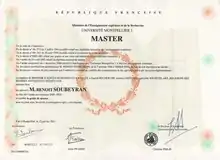Master's degree (France)
In the French education system, the master's degree is both, a national higher education diploma and a university degree, validating a second cycle of higher education, i.e. an average of five years of study after the baccalaureate.
The diplôme national de master (national master's degree, sometimes referred to by the acronym DNM) is delivered by a public institution such as a university, two years after obtaining a Licence (French equivalent of a Bachelor's degree, worth 300 ECTS). It confers the degree of the same name. The grade de master (master's degree) may be awarded by non-university institutions such as engineering schools.
The name "master" is inspired by the master's degree, i.e. the master's degree in Anglo-Saxon university systems.
History
During the existence of the Université de France, three degrees were established: the Baccalauréat, the Licence degree and the Doctorate. This gradation was then gradually forgotten.
Created in 1966, the master's degree is awarded at the end of the second cycle of university graduate studies. Students holding a master's degree can then pursue studies in a third cycle leading either to a one-year specialized higher education diploma (created in 1977), in order to "acquire in-depth knowledge in specific areas complementary to the training provided in the second cycle and to acquire techniques designed to promote the exercise of a specific type of activity", or at the doctorate level after one year of in-depth teaching and an introductory research internship leading to the diplôme d'études approfondies (created in 1964 in science and 1974 in other disciplines), followed normally by three years of research leading to the writing of a thesis.
National Master's degree
Objectives
The second cycle combines general education and vocational training, and should enable students to complete their knowledge, deepen their culture and introduce them to scientific research.[1] The training provided for the national master's degree includes theoretical, methodological and applied teaching and necessarily includes one or more periods of professional experience (internships, contracts, civic service, etc.). It also includes an introduction to research and, in particular, the writing of a dissertation or other personal study work. The master's degree also validates the ability to master at least one foreign language.
In 2010, master's degrees designed to train teachers (primary and secondary school teachers, documentalist teachers and senior education advisers before taking the competitive examination) are making their appearance.[2]
Fields and mentions

Since the LMD reform, Master's degrees have been classified into fields and mentions. The fields are chosen by each university, first freely (first habilitations 2003-2006) and then, from 2007, from a list of four national fields, which is fixed by the national training framework in 2014.
- Arts, lettres, langues
- Droit, économie, gestion
- Sciences humaines et sociales
- Sciences, technologies, santé
Master's degree
Diplomas leading to a master's degree
The master's degree is conferred by the State to holders of the national master's degree, as well as to holders of certain specific degrees
- Master of Advanced Studies
- Diplôme d'Ingénieur
- Health diplomas
The master's degree is also conferred by the State on holders of diplomas from certain establishments, after a periodic national evaluation. A specification defining the criteria taken into account when examining a request for a diploma to confer the university degree of master is published in 2014[3] and updated in 2020.[4]
References
- "Code de l'éducation - Article L612-5". LegiFrance. Retrieved 13 April 2020.
- "BULLETIN OFFICIEL N° 1 DU 7 JANVIER 2010". Retrieved 13 April 2020.
- "Arrêté du 22 janvier 2014 relatif au cahier des charges des grades universitaires de licence et de master". Retrieved 13 April 2020.
- "Arrêté du 27 janvier 2020 relatif au cahier des charges des grades universitaires de licence et de master". Retrieved 13 April 2020.